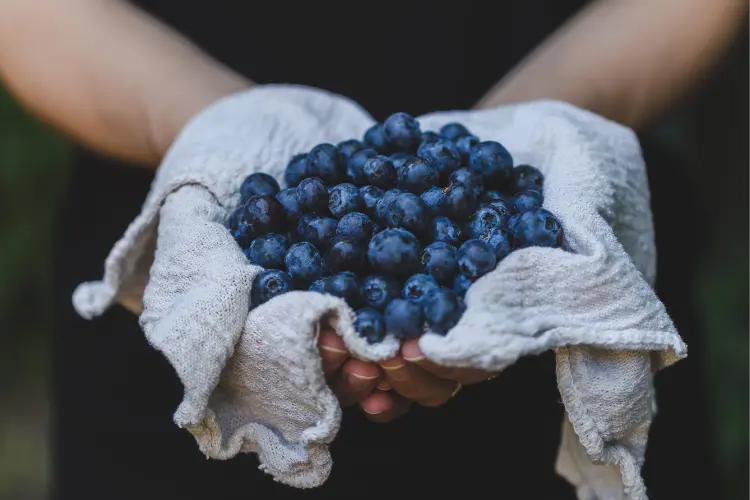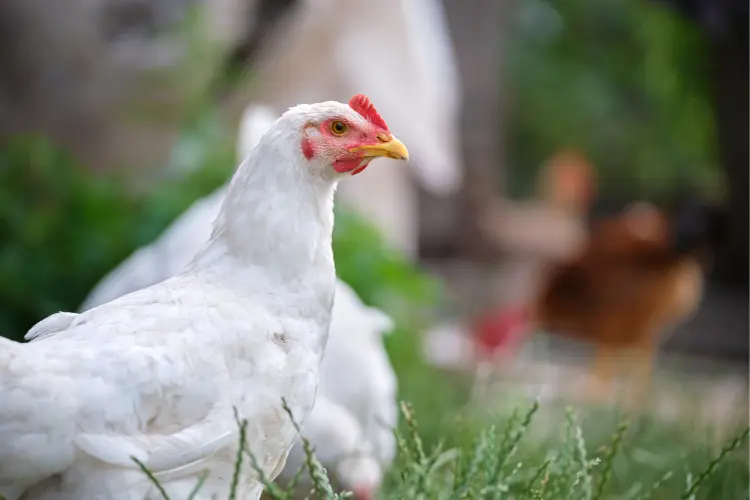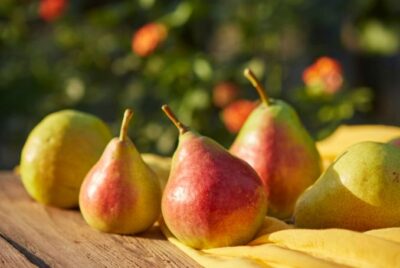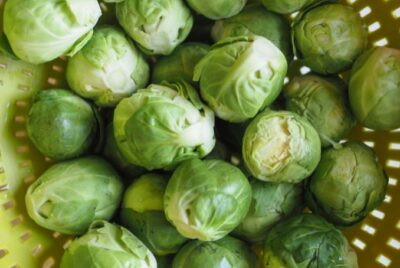Can Chickens Eat Blueberries: Healthy Snack or Hidden Hazard?
Finding the right food for your chickens can feel like walking a tightrope. You’re constantly searching for foods that are both nutritional and safe for your flock. And while variety food is essential for a chicken’s diet, knowing which foods are beneficial and which can potentially harm them is not always straightforward.
So, can chickens eat blueberries? Are these vibrant berries a healthy snack, or could they pose a hidden hazard to your feathery friends? Let’s explore this in detail, so you can confidently navigate your chickens’ dietary needs and ensure they get the nutrition they require without risking their health.
Can Chickens Eat Blueberries?
Yes, chickens can eat blueberries. Blueberries are safe for chickens to consume, and they can be a healthy addition to their diet. Chickens typically enjoy the taste of blueberries, which can be a great source of antioxidants, vitamins, and other nutrients.
Read also: Best Plants to Grow as Chicken Feed Alternatives
Important Guidelines When Feeding Your Chickens Blueberries
Feeding your chickens blueberries can be a wonderful treat, but there are a few important guidelines to follow to ensure the health of your flock:
- Wash the blueberries before offering them to your chickens. This will help to remove any pesticide residues or dirt.
- Scale down the number of berries according to your flock size. Typically, three berries per chicken should suffice for their dietary needs.
- If you’re feeding blueberries to young chicks, it’s a good idea to chop the berries into smaller, manageable pieces to prevent choking.
- After introducing blueberries into your chickens’ diet, observe their reaction. If any bird seems unwell or shows distress, discontinue feeding the blueberries and consult a veterinarian.
- While soft, ripe berries are great, overripe berries can ferment and cause digestive issues. Always choose berries that are just ripe for the safest option.

- Do not feed your chickens blueberries every day. Consider them as a treat.
- Choose the appropriate time to feed your chickens. Mornings are usually best for digestion, but an evening meal can also help sustain them throughout the night.
- If your chickens haven’t tried blueberries, introduce them slowly so their tummies don’t get upset.
- While blueberries are nutritious, a balanced diet is crucial for the overall health and productivity of your chickens. Ensure they get a variety of other foods, such as quality chicken feed, grains, and other fruits and vegetables.
- Always ensure the blueberries are in good condition and safe for your birds. Never feed them moldy or rotten berries, as they may contain harmful toxins. Soft, ripe blueberries are the best choice.
Benefits of Blueberries For Chicken
Rich in Antioxidants
Blueberries are packed full of antioxidants that can help protect the chicken’s cells from damage caused by free radicals. These antioxidants can also strengthen the chicken’s immune system, thus preventing various diseases.
Nutrient-Dense
Blueberries contain essential vitamins and minerals such as vitamins C and K, manganese, copper, and fiber. These nutrients are vital for maintaining the chicken’s overall health, aiding digestion, and supporting their immune system.
Promote Heart Health
Studies have suggested that blueberries can lower cholesterol levels and promote heart health. This is essential for the overall well-being of your chickens.

Boost Brain Function
Blueberries aren’t just good for the body; they’re also beneficial for the brain. Numerous studies have shown that the antioxidants in blueberries can delay brain aging and improve memory, which can be especially beneficial for older hens.
Blueberries Aid in Digestion
Blueberries’ high fiber content helps regulate the digestive system of chickens. Fiber aids in preventing constipation and maintaining regular bowel movements, contributing to overall digestive health.
Enhance Skin and Feather Health
The vitamins in blueberries promote healthy skin and vibrant feathers in chickens. This not only contributes to their appearance but also their general health.
Aid in Blood Sugar Regulation
Research has shown that berries, particularly blueberries, can help regulate blood sugar levels. When consumed in the right quantities, blueberries can help maintain the health of your chickens, especially in maintaining their energy levels throughout the day.
Provides hydration
Blueberries are composed of 85% water, which can contribute to the hydration of your chickens, especially during hot weather. Staying well-hydrated is crucial for chickens’ health, and treats like blueberries can help achieve this.
Delicious Treat
Chickens love blueberries, making them a great choice for a treat. However, it’s important to feed them your chickens in moderation and as part of a balanced diet.
Enhances skin and feather health
The various vitamins and minerals found in blueberries, such as vitamin A and vitamin C, are known to promote healthy skin and feathers in chickens. Regular consumption of blueberries can help your chickens maintain vibrant, healthy plumage.
Promotes eye health
Blueberries are rich in antioxidants that are known to protect eyesight. Certain antioxidants found in blueberries, such as anthocyanins, protect the eyes from harmful free radicals, while others help to reduce the risk of macular degeneration, cataracts, and other age-related conditions.
Can Chickens Eat Blueberries Whole?
Yes, chickens can eat blueberries whole. The size of blueberries is generally suitable for chickens, and they can safely peck at and consume whole blueberries. Chickens are adept at breaking down foods in their gizzard, a specialized stomach constructed to grind foods.
Can Chickens Eat Blueberry Muffins
No, while chickens technically can eat blueberry muffins, it’s generally not recommended to feed them these kinds of processed foods regularly.
Blueberry muffins, like many other human foods, can contain ingredients that aren’t ideal for a chicken’s diet. They often have a high sugar content, which isn’t good for chickens. Too much sugar can lead to health problems in chickens, such as obesity, heart disease, or metabolic disorders.
Can Chickens Eat Frozen Blueberries
Yes, chickens can eat frozen blueberries. However, it’s important to thaw the blueberries before giving them to your chickens. This is mainly for the chickens’ comfort and to prevent any potential harm from them trying to peck at the hard, frozen berries.
Frozen blueberries can be a great way to provide your chickens with a treat, especially during hot summer months when the cold berries can help to keep your chickens cool. Also, using frozen blueberries can be a good option when fresh ones aren’t in season or readily available.

FAQ
Can Chickens Eat Cheese?
Yes, chickens can eat cheese, but it should be given in moderation as an occasional treat due to its high-fat content.
Can Chickens Eat Tomatoes?
Yes, chickens can eat tomatoes, but it’s important to remove the leaves and stems as they contain solanine, which can be toxic to chickens. Ripe, red tomatoes are preferable, and they should be given in moderation.
Can Chickens Eat Apples?
Yes, chickens can eat apples. We recommend cutting them into small, manageable pieces to avoid choking hazards.
Can Chickens Eat Lettuce?
Yes, chickens can eat lettuce, but it should be given in moderation as a treat. Iceberg lettuce has a high water content and lacks significant nutritional value, so other leafy greens like romaine or kale are better options.
Can Chickens Eat Peppers?
While chickens can eat peppers, it’s important to note that they may not be particularly fond of them. However, the fruit of the pepper can be fed to chickens. It’s crucial to avoid feeding them the leaves, plants, or flowers of peppers.
Can Chickens Eat Cucumbers?
Yes, chickens can eat cucumbers. They are a hydrating and refreshing treat for chickens.
Can Chickens Eat Grapes?
Yes, chickens can eat grapes, but they should be given in moderation as a treat due to their high sugar content.
Can Chickens Eat Celery?
Yes, chickens can eat celery. It’s a healthy and crunchy treat that can be given to chickens in moderation.
Can Chickens Eat Raspberries?
Yes, chickens can enjoy raspberries as a tasty and healthy snack, but it’s important to give them in small amounts.
Can Chickens Eat Blueberry Plants?
Yes, chickens can eat blueberry plants. They may peck at the leaves or scratch around the plants, but it’s important to note that blueberry plants should not be a staple food for chickens.
Conclusion
Your chickens can eat blueberries in their coop, and these fruits are good for them. Blueberries have lots of important vitamins, antioxidants, and fiber that can keep your chickens healthy. They can be a fun treat for your chickens and help them behave naturally. Just remember to give them in moderation so they don’t eat too much and upset their diet.




